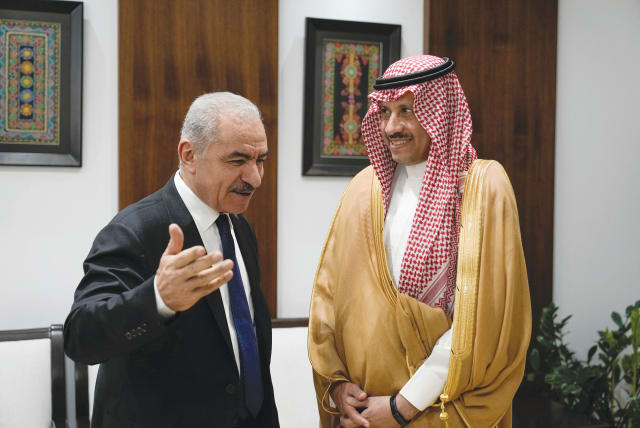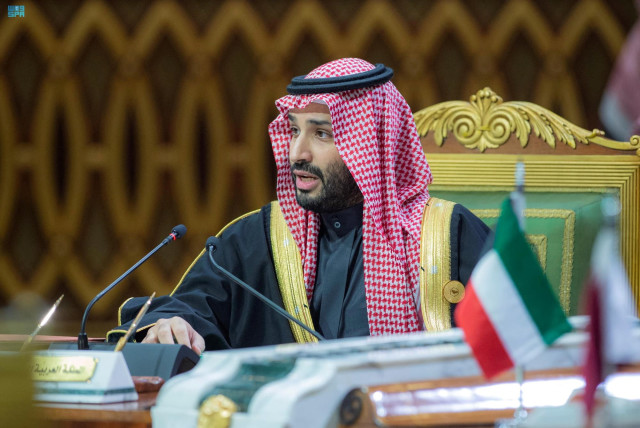Riyadh's trial balloons may be intended to be noted

BEHIND THE LINES: The supposed “progressives” in the Biden administration are the ones who are cleaving to older ideas, while the “conservatives” in Riyadh are looking to move beyond them.
In the latest indication of progress toward a normalization agreement between Israel and Saudi Arabia, US National Security Council Coordinator for Strategic Communications John Kirby told reporters last week that a “basic framework” for a deal has already been reached.
Kirby’s statement came as Israel’s Communications Minister Shlomo Karhi prepared to lead an Israeli delegation to a conference in Saudi Arabia. Karhi will be the second Israeli minister to visit the desert kingdom in the last month. His visit comes less than a week after Tourism Minister Haim Katz traveled to Riyadh.
Amid the growing indications of progress on this file, a number of clearly identifiable obstacles remain. The question of Riyadh’s ambitions in the nuclear realm, and its desire for clear security guarantees from the United States, await resolution. No less importantly, the Israeli-Palestinian conflict constitutes a barrier to any agreement, unless and until the Saudis find a way to finesse this issue.
Riyadh may be leaning toward flexibility in this regard
Indications are emerging to suggest that Riyadh may be leaning toward flexibility in this regard.
The issue here should be stated plainly. The Israeli-Palestinian conflict is not solvable, at least for as long as the current Palestinian political dispensation remains in place. Palestinian politics is divided between a powerful Islamist movement formally committed to Israel’s destruction, and a decrepit “nationalist” authority dependent on Israel for its survival, but still formally committed to demands that would mean Israel’s demise (the “right of return”). Given this, the now considerable history of successful Israeli-Arab diplomacy has depended on the willingness of Arab states to bypass the barrier represented by the Palestinians, and to separate their own issues vis-à-vis Israel from the Palestinian file. This is generally accompanied by a gesture of some kind on the Palestinian issue. The Camp David Accords between Israel and Egypt established this formula. The 1994 peace treaty with Jordan and the Abraham Accords of 2020 followed it.
For Saudi Arabia, the issue matters because, as the “custodian of the two holy mosques,” the country to a degree possesses and can confer or withhold the stamp of Islamic legitimization. The banner of the Palestinian cause may be somewhat frayed, but still, this issue retains power and relevance at the symbolic level across the Arab and broader Islamic world.
ABDULRAHMAN AL-RASHED, former chairman of the Al-Arabiya media channel and former editor of Asharq al-Awsat newspaper, is one of the leading journalists in Saudi Arabia and the Arab world. His now occasional columns in Asharq al-Awsat are widely held to reflect trends of thinking at the Saudi court and among the most senior figures within it. As such, his writing is worthy of close study.
In a pair of columns this week, published on October 1 and 2, he tackled the issue of the Israel-Saudi normalization process and the Palestinian issue.
In the first of these, titled “The Saudi-Israeli negotiation,” he begins with the blunt statement that “peace projects with Israel may be divided into the collective and the bilateral. The collective approach failed.”
He then goes on to list a number of multilateral Arab-Israeli peace initiatives which failed to lead to agreements. The 1991 Madrid Conference and the Trump administration’s “Deal of the Century” are included in the list.
“Regarding the bilateral agreements,” the author continues, “almost all of them succeeded in their declared goals, the signatories maintained their commitments, and they continue until the present day.”
Rashed lists the Camp David Accords, the peace treaty with Jordan, and the Abraham Accords with the UAE, Bahrain, Morocco, and Sudan.
Arriving at the central point, the Saudi journalist asks “What are the goals of the Saudi-Israeli negotiation, if it actually gets going?”
He answers his own question plainly in the following terms: “All Arab-Israeli agreements were based on a bilateral exchange of interests. It is likely that Saudi efforts will follow the same approach.”
After listing the various areas in which Saudi Arabia seeks to attain benefit from the US side in the course of the negotiations (nuclear issue, defense cooperation, weapons systems), Rashed goes on to address the place of the Palestinian issue in the Saudi-Israel diplomatic process. Again, the wording is not ambiguous: “The bilateral negotiations, Saudi-Israeli, will be decided by the two countries. As for the peace negotiations based on the formula of a Palestinian state and resolution of outstanding issues – the refugees, settlements, the capital city – decisions on these will be in the hands of the Palestinians alone, in their separate process of negotiations.”
Rashed concludes with subtle digs at both the Palestinian Authority leadership and the Abraham Accords countries. He notes that the Palestinians had been intended to benefit from previous bilateral negotiations between Arab states and Israel, and yet did not do so. He then asserts that “this is not the time to blame the Palestinian Authority for missed opportunities, nor to rebuke the Arabs for their failure to support the Palestinian people.” Finally, the Saudi columnist concludes that “the Saudi path may not achieve a Palestinian state, but it will create a political climate supportive of this.”
In the second article, “Bilateral relations with Israel,” Rashed reiterates many of the points outlined here, while more directly attacking the alternative Arab approach to Israel that has continued alongside the diplomatic path pioneered first by Anwar Sadat in Egypt. This alternative approach is termed here the “resistance front,” the term preferred by Iran for itself and its proxies and allies.
However, Rashed relates the present Iran-led iteration of this approach to earlier, Arab-led versions as supported by the Saddam Hussein regime in Iraq and the Assad regimes in Syria. He contends that “over the course of four decades [this approach] has not succeeded in fulfilling any of the promises it made to the Palestinian people. It did not recover an inch of the occupied land, did not enable the return of a single Palestinian from among the millions of refugees, and exploited the issue to serve the interests of regional powers.”
The article goes on to discuss a variety of possible practical projects that could accompany the successful conclusion of a normalization agreement between Saudi Arabia and Israel.
RASHED’S ARTICLES are not the first of their type to appear in the Saudi media. A week earlier, journalist and economic analyst Ali al-Mazyad, writing in the same publication, expressed similar sentiments. Rashed is the most senior and influential figure, however, to have expressed himself in these terms.
Saudi Arabia, it is worth remembering, is not a democracy, and its media do not resemble those of the West. Rather, as elsewhere in the Middle East, officially sanctioned news outlets reflect messages that the ruling authorities wish to convey. Given this, Rashed’s columns this week in Asharq al-Awsat should probably be seen as trial balloons, introducing ideas that the Saudi court wants presented in the public space at this time. If so, the ideas presented give cause for tempered optimism.
The Saudi-Israeli diplomatic process remains a moving picture, with many considerations requiring resolution. It appears, nevertheless, that in common with other, preceding Arab states, Riyadh does not intend to allow itself to be held back by the determination of both sides in Palestinian politics to cleave to old, intransigent positions.
As to whom the public messages are intended for, some recent reporting has suggested joint Israeli and Saudi frustration at the US administration’s emphasis on the Palestinian issue and the need for Israeli concessions as part of any normalization agreement. If this reporting is accurate, Rashed’s trial balloons may be intended to be noted in Washington.
If so, it is interesting to observe that the supposed “progressives” in the Biden administration are the ones who are cleaving to older ideas, while the “conservatives” in Riyadh are looking to move beyond them.
Jerusalem Post Store
`; document.getElementById("linkPremium").innerHTML = cont; var divWithLink = document.getElementById("premium-link"); if (divWithLink !== null && divWithLink !== 'undefined') { divWithLink.style.border = "solid 1px #cb0f3e"; divWithLink.style.textAlign = "center"; divWithLink.style.marginBottom = "15px"; divWithLink.style.marginTop = "15px"; divWithLink.style.width = "100%"; divWithLink.style.backgroundColor = "#122952"; divWithLink.style.color = "#ffffff"; divWithLink.style.lineHeight = "1.5"; } } (function (v, i) { });

